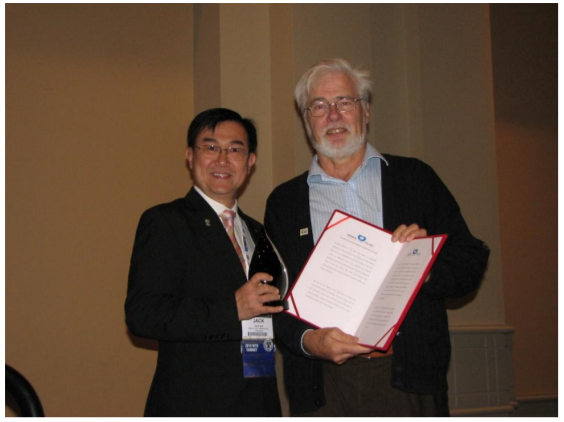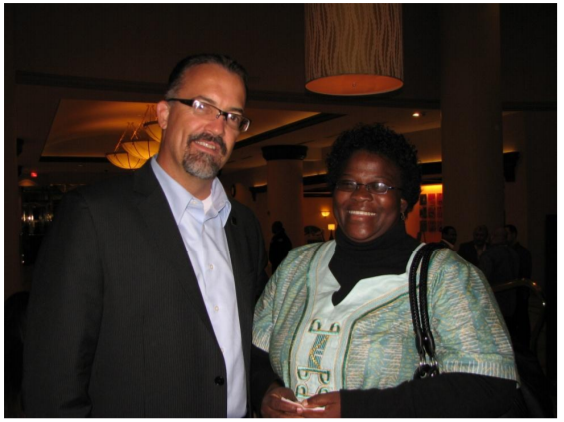
Day Two of ICC World Toilet Summit: Global Sanitation Crisis Focus of WTO, ICC, UN Speakers
![]() Philadelphia, PA – The second day of the International Code Council World Toilet Summit 2010 began with an International Breakfast where officials from the United Nations/UNICEF, the World Toilet Organization and the International Code Council emphasized the need for a collaborative effort to combat the global sanitation crisis. The Summit is being held in conjunction with the American Society of Plumbing Engineers (ASPE) during their biennial convention and exposition. Throughout the day many high-level and influential meetings were held concluding with an evening gathering of Summit speakers, attendees and staff to continue their dialogue and important networking among key industry leaders.
Philadelphia, PA – The second day of the International Code Council World Toilet Summit 2010 began with an International Breakfast where officials from the United Nations/UNICEF, the World Toilet Organization and the International Code Council emphasized the need for a collaborative effort to combat the global sanitation crisis. The Summit is being held in conjunction with the American Society of Plumbing Engineers (ASPE) during their biennial convention and exposition. Throughout the day many high-level and influential meetings were held concluding with an evening gathering of Summit speakers, attendees and staff to continue their dialogue and important networking among key industry leaders.
“ASPE is honored to host the ICC World Toilet Summit 2010 and we welcome the esteemed group of delegates and speakers from six continents,” said Julius Ballanco, President of the Board of Directors of ASPE. “The diverse and life-critical topics they are presenting have given this year’s ASPE convention a much more enriching experience for all of our attendees.”
Jay Peters, the Code Council’s Plumbing, Mechanical and Fuel Gas (PMG) Executive Director emceed the Breakfast event and was also the first speaker. His presentation focused on the global sanitation crisis and the Code Council’s Safewater initiative, an effort to work with industry partners to overcome the startling statistic that every 15 seconds a child dies of a waterborne illness due to lack of proper sanitation. It is because of the strong relationships the Code Council has with both the World Toilet Organization and ASPE that the Summit has taken place in the United States and the ICC Safewater initiative has been able to gain momentum.
Jack Sim, founder of the World Toilet Organization (WTO) then elaborated on the sanitation crisis, but focused primarily on the tremendous amount of business opportunities that exist in the global sanitation market since 1.8 billion of the 2.6 billion people without toilets can afford to buy them, but are opting for more boast-worthy items like cell phones and TVs. Since this audience was largely comprised of plumbing engineers and designers, it was particularly important since they are the implementers of sanitation solutions and need to understand obstacles that must be overcome to play their part to the fullest.
Mr. Sim also presented WTO Hall of Fame 2010 awards to Professor Jan-Olof Drangert with Linkoping University’s Department of Water and Environmental Studies in Sweden, Therese Dooley, Senior Advisor of Hygiene and Sanitation with UNICEF, and Michael Roberts, Country Director with International Development Enterprises, Cambodia.
As the 2010 winner of the World Health Organization’s Award for Healthy Cities, Mr. Sang-Joo Kim of Gangnam-gu, Seoul, South Korea, made an impressive presentation about their innovative approach to expanding the availability of restrooms in their city. Instead of constructing more restrooms, they instead established a subsidization program whereby businesses open their restrooms to the public. There is even a mobile phone app that directs people to nearby restroom locations.
Leanne Burney, Expert in Strategies on Water and Sanitation with the United Nations Secretary General’s Advisory Board on Water and Sanitation, spoke about their committee’s goals to reduce the number of people without access to proper sanitation by 50% by 2015.
Aside from being a recipient of a World Toilet Organization Hall of Fame Award, Therese Dooley also spoke about how critical proper hygiene is and what UNICEF is doing around the world to educate people about this simple, yet life-saving habit.
The International Breakfast concluded with Current TV’s documentary film, “World Toilet Crisis.” Narrated by Adam Yamaguchi and produced by Lisa Biagiotti, this is a no-holds-barred presentation on the reality that nearly half of the world’s population faces every day.
Peters and Sim were also asked to speak during ASPE’s Opening Session. Peters shared a brief overview of just some of the many successes the Code Council’s PMG Group has achieved over the past year, including many code adoptions at varying governmental levels and MOUs with myriad noted organizations, on both domestic and international levels, all designed to promote cooperation and expansion of PMG programs and initiatives that will benefit communities around the nation and across the globe.
Following these meetings, the ASPE Engineering Plumbing Exposition opened. Hundreds of exhibitors presented various plumbing-related products and services, including the World Toilet Summit and the International Code Council’s broad product line, in addition to ICC Evaluation Services (ICC-ES), a subsidiary of ICC, with their industry leading innovative building products evaluation programs and PMG Listing services.
Participants indicated that one of the most beneficial features of WTS Day Two was when dozens of sanitation devotees gathered at the end of the day for informal discussion about toilets, health, sanitation, environmental issues. Many of the speakers along with key stakeholders had never met in person before the event. Guy Tomberlin, Code Council Board Member said, “The incredible diversity of noted speakers from around the world and the passion for what we all do is truly impressive. The Code Council is extremely proud of its strong relationships with both ASPE and WTO. We look forward to many more collaborations in the future.”
Highly anticipated tracks covering innovations in toilet design, bottom of pyramid market and micro-financing, and ICC technical sessions on water conservation and other plumbing engineering applications began on Tuesday, November 2.


The American Society of Plumbing Engineers (ASPE) was founded in 1964 as an organization dedicated to the advancement of the plumbing engineering profession. The Society disseminates technical data and information, sponsors activities that facilitate interaction with fellow professionals, and, through research and education, expands the base of knowledge of the plumbing engineering industry. Its 7,000 members on five continents represent an extensive network of experienced engineers, designers, contractors, code officials, manufacturers, and manufacturer representatives interested in advanced their careers, their profession, and the industry. Contact ASPE for additional information at 847-296-0002 or visit www.aspe.org.
The International Code Council (ICC) publishes building safety, fire prevention and energy efficiency codes that are used in the construction of residential and commercial buildings. Most U.S. cities, counties and states choose the I-Codes based on their outstanding quality. The ICC’s Plumbing, Mechanical and Fuel Gas (PMG) Group is devoted exclusively to providing PMG products and support to jurisdictions and construction industry professionals across the country and around the globe, with one or more PMG codes adopted in all 50 states. The more than 200 superior products and related services were developed specifically by and for plumbing and mechanical professionals. Contact the PMG Group for additional information at 1-888-ICC-SAFE, x4PMG or visit www.iccsafe.org.
The World Toilet Organization (WTO) is a global non-profit organization committed to improving toilet and sanitation conditions worldwide. WTO is also one of the few organizations to focus on toilets instead of water, which receives more attention and resources under the common subject of sanitation. Founded in 2001 with 15 members, it now has 235 member organizations in 58 countries, all of which are working towards eliminating the toilet taboo and delivering sustainable sanitation.WTO was created as a global network and service platform wherein all toilet and sanitation organizations can learn from one another and leverage on media and global support that, in turn, can influence governments to promote sound sanitation and public health policies. To learn about all of the initiatives with which the WTO is engaged, visit www.worldtoilet.org.








